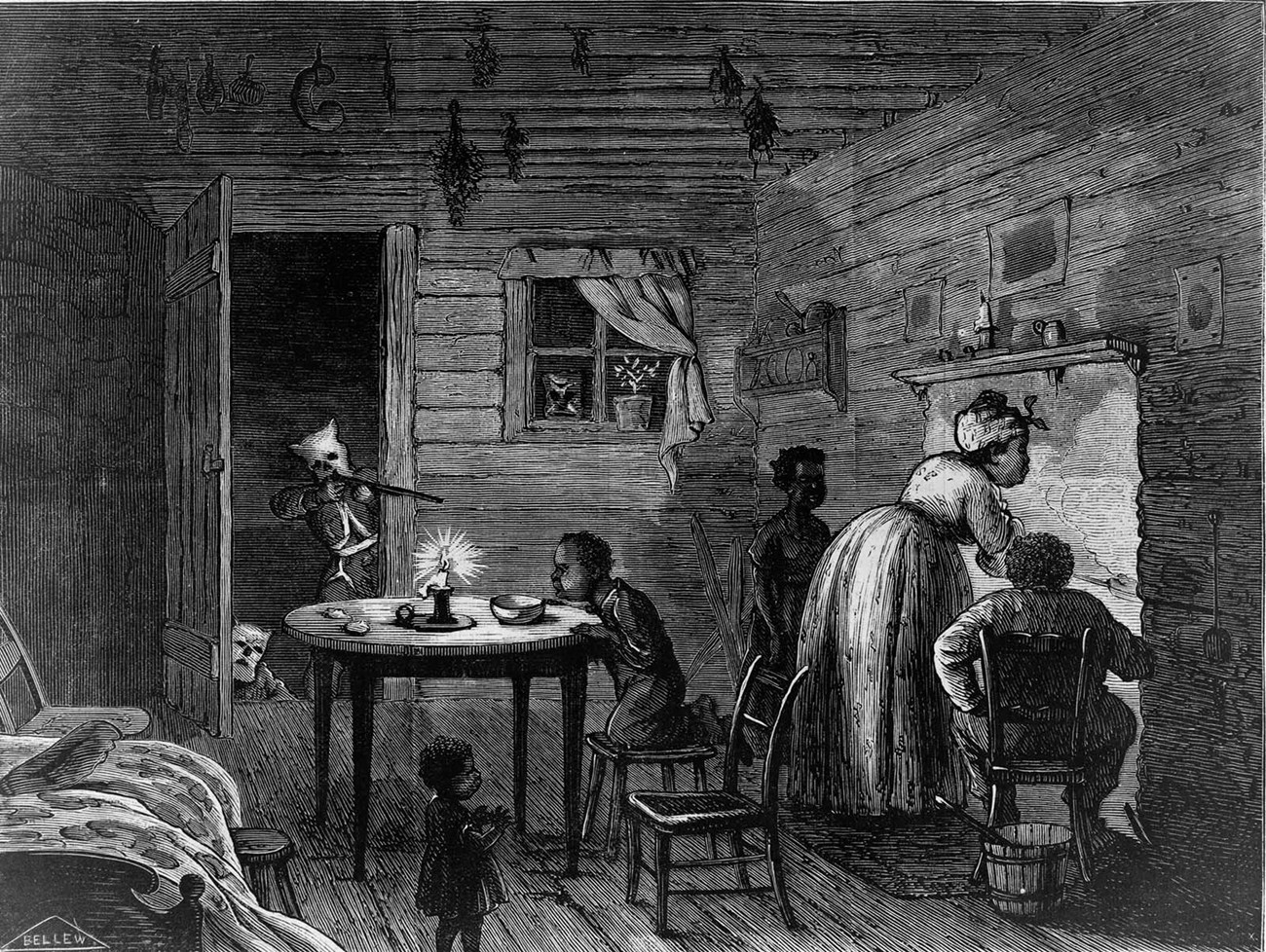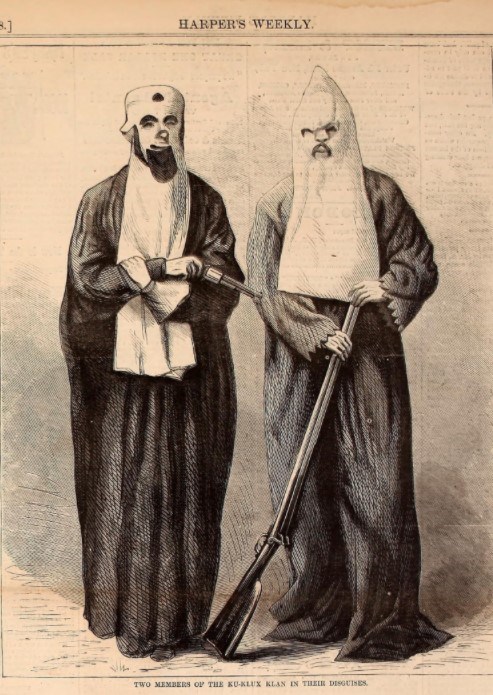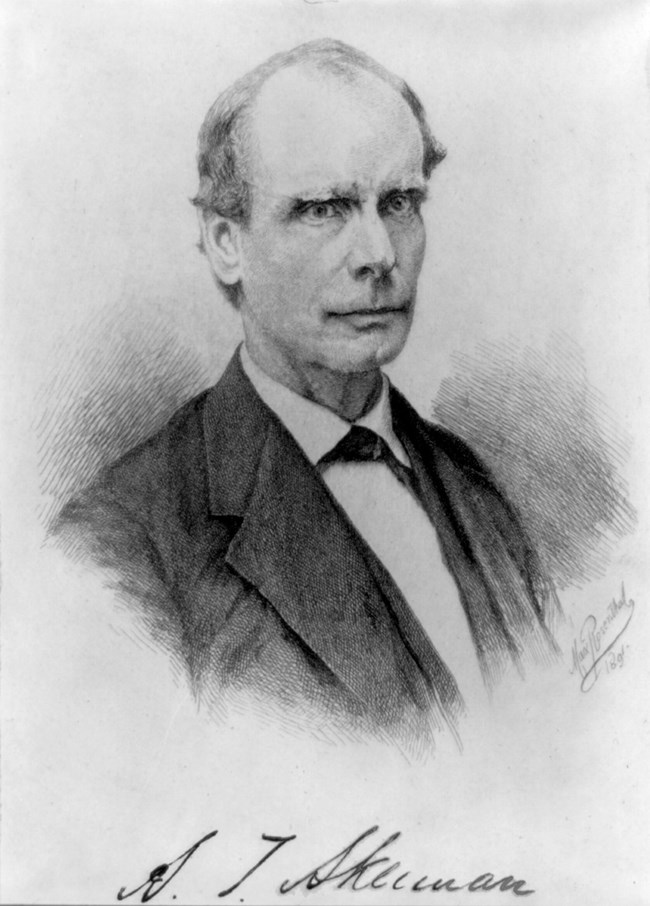Last updated: December 16, 2021
Article
President Grant Takes on the Ku Klux Klan

Library of Congress
Ulysses S. Grant faced numerous challenges during his presidency (1869-1877). The Civil War had recently ended in 1865, ushering in the beginning of the Reconstruction era. The transition to Reconstruction altered the direction of the country, especially the lives of African Americans. The 13th, 14th, and 15th amendments ended slavery, extended US citizenship to African Americans with equal protection under the law, and established voting rights for African American men. Black Americans also attended school, established their own churches, becoming politically active, and held political offices at the local, state and federal level. They were overwhelmingly members of the Republican Party largely due to Republican support for emancipation and civil rights. As these dramatic changes were taking place throughout southern society, many White Southerners resented this newfound independence among African Americans and rejected the Republican Party. Some turned towards violence to maintain white supremacy and topple Republican rule in the south. As president, Grant needed to find ways to curb this violence.
The most well-known violent white supremacist group to form during this period was the Ku Klux Klan. The Klan had rather mysterious origins. It was formed in Pulaski, Tennessee in 1866 by six Confederate veterans who, bored with civilian life, founded the Klan to mainly play pranks. However, as the Klan spread throughout the South, its members’ intentions became more sinister and violent. KKK members attacked freedpeople exercising their new rights as well as whites who supported the Republican Party. Their methods included burning Black schools and churches, intimidating Black and Republican voters, and even resorting to rape and murder. KKK members often wore ghoulish disguises and committed their crimes at night, terrifying their victims. Worse, the Klan’s goals were supported by many local officials as well as law enforcement, which meant that Klan violence was rarely prosecuted at the local or state level. Klan activities threatened to undermine federal reconstruction efforts in the former Confederacy. Therefore, Republican governors and officials appealed to President Grant for help if local and state authorities were unable or unwilling.

Harper's Weekly Archives on the Internet Archive
President Grant looked at the violence with increasing concern. He had a genuine regard for the well-being of the freedpeople who had supported the Union in large numbers and was concerned that the actions of the Ku Klux Klan were undermining the verdict of the Civil War. Sadly, the Federal Government’s resources for curbing this widespread violence were limited, especially within the U.S. military, which had downsized significantly since the end of the Civil War. Grant was nevertheless determined to do something. In a letter to Speaker of the House James G. Blaine, Grant wrote, “there is a deplorable state of affairs existing in some portions of the south demanding the immediate attention of Congress. If the attention of Congress can be confined to the single subject of providing means for the protection of life and property in those sections of the Country where the present civil authority fails to secure that end, I feel that we should have such legislation.”
Congress responded with three “Force Acts” aimed at stopping the violence, especially within the Ku Klux Klan. The Enforcement Act of May 1870 prohibited “banding together” or “going in disguise upon the public highways or upon the premises of another” to violate a citizen’s constitutional rights. As the Klan was known for their disguises, this act called put them on notice. The Second Force Act of February 1871 put federal elections under federal supervision mainly by federal judges and U.S. Marshals. Finally, the Third Force Act of April of 1871 empowered President Grant to suspend Habeas Corpus and use the military to enforce these acts. The latter two Force Acts were also known as the “Ku Klux Klan Acts.”
Grant didn’t waste much time. On May 3, 1871, he issued a proclamation warning that terroristic acts of violence would not be tolerated by his administration. Grant tried to appeal to the people of the South. “I do particularly exhort the people of those parts of the country to suppress all such combinations [lawlessness] by their own voluntary efforts,” Grant remarked, “and to maintain the rights of all citizens of the United States and to secure to all such citizens the equal protection of the laws.” Continuing, the President warned that “I will not hesitate to exhaust the powers thus vested in the Executive, whenever and wherever it shall become necessary to do so for the purpose of securing to all citizens of the United States the peaceful enjoyment of the rights guaranteed to them by the Constitution and laws.”

Wikipedia
Due to limited federal resources, Grant decided to make an example of several counties in the piedmont region of South Carolina, where some of the worst violence and lawlessness was taking place. After the Klan in that area failed to heed Grant’s warning, he utilized the Third Force Act. President Grant suspended habeas corpus (the right of a detained person to request help from a court to determine if their imprisonment is lawful) and declared martial law in nine mostly upstate South Carolina counties. Detachments of the 7th U.S. Cavalry were stationed in the area and worked to gather information and intelligence on local Klan activities. The military and US. Marshals then rounded up suspected Klan members for trial. The military then worked with the Department of Justice and Grant’s Attorney General, Amos Akerman, to prosecute KKK members suspected of engaging in terroristic violence. The Department of Justice had recently been established under the Attorney General's authority after President Grant asked Congress to pass a law establishing the office, which was done on June 22, 1870. The Justice Department aimed to protect the rights of newly-freed African Americans and serve as the federal government's enforcement mechanism for the various laws described above.
These efforts had mixed success. During the period of martial law, many Klan members went into hiding or fled. Federal resources were thin and Grant’s political adversaries—both North and South—railed against the alleged overreach of federal power as a violation of federalism. Issues of state and federal jurisdiction were often argued more vigorously than the seriousness of the crime itself. Akerman resigned as Attorney General in the end of 1871, ending the federal government’s most vigorous period of enforcement. Many convicted KKK members were given light sentences. Later, the increasing takeover by the Democrats of state and local governments made the Klan less relevant because White supremacists gained control of the laws in the South. But Grant’s decisive action temporarily reestablished law and order in the South allowing African Americans and those who supported them some relief from the horrific violence surrounding their communities.
John Y. Simon, ed., The Papers of Ulysses S. Grant, Volume 21: November 1, 1870- May 31, 1871. Carbondale. Southern Illinois University Press, 1998. pgs. 218, 219, 336, 337.
U.S. Senate: The Enforcement Acts of 1870 and 1871
